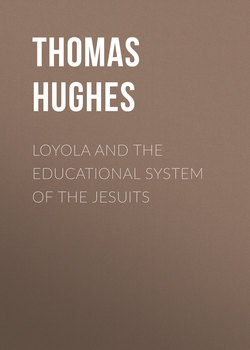Loyola and the Educational System of the Jesuits

Реклама. ООО «ЛитРес», ИНН: 7719571260.
Оглавление
Hughes Thomas. Loyola and the Educational System of the Jesuits
PREFACE
Part I. EDUCATIONAL HISTORY OF THE ORDER
CHAPTER I. INTRODUCTION
CHAPTER II. KNIGHT, PILGRIM, AND SCHOLAR
CHAPTER III. THE UNIVERSITY OF PARIS. ROME
CHAPTER IV. COLLEGES AS PROPOSED IN THE JESUIT CONSTITUTION
CHAPTER V. COLLEGES FOUNDED AND ENDOWED
CHAPTER VI. THE INTELLECTUAL SCOPE AND METHOD PROPOSED
CHAPTER VII. THE MORAL SCOPE PROPOSED
CHAPTER VIII. IGNATIUS ADMINISTERING THE COLLEGIATE SYSTEM. HIS DEATH
CHAPTER IX. SUBSEQUENT ADMINISTRATIONS
Part II. ANALYSIS OF THE SYSTEM OF STUDIES
CHAPTER X. AQUAVIVA. THE RATIO STUDIORUM
CHAPTER XI. FORMATION OF THE MASTER. HIS COURSES OF LITERATURE AND PHILOSOPHY
CHAPTER XII. YOUTHFUL MASTERS
CHAPTER XIII. THE COURSES OF DIVINITY AND ALLIED SCIENCES. PRIVATE STUDY. REPETITION
CHAPTER XIV. DISPUTATION. DICTATION
CHAPTER XV. FORMATION OF THE SCHOLAR. SYMMETRY OF THE COURSES. THE PRELECTION. BOOKS
CHAPTER XVI. THE CLASSICAL LITERATURES. SCHOOL MANAGEMENT AND CONTROL
CHAPTER XVII. EXAMINATIONS AND GRADUATION. SCHEDULE OF GRADES AND COURSES
THE LITERARY CURRICULUM
THE PHILOSOPHICAL CURRICULUM
THE THEOLOGICAL CURRICULUM
GENERAL DISTRIBUTION OF TIME
CHAPTER XVIII. CONCLUSION
BIBLIOGRAPHICAL APPENDIX,
Отрывок из книги
A learned and elegant work, which narrates the rise and progress of Christian Schools, from the sixtieth year of the Christian era onwards, ends its long journey at the date of the Reformation, and takes leave of its varied subject, and of its lines of Christian Scholars, in these words: "We leave them at the moment when the episcopacy was recovering its ancient jurisdiction over the ecclesiastical seminaries, and when a vast majority of the secular schools of Catholic Christendom were passing into the hands of a great Religious Order, raised up, as it would seem, with the special design of consolidating anew a system of Christian education."1
Two centuries and a half later, when the Society of Jesus had run a long course, from the date of the Reformation which had seen it rise, up to the eve of the Revolution which beheld it extinct, a General of the Order, Ignatius Visconti, addressing the Provincial Superiors over the world, takes note of a new stage in the process of educational development: "The taste for letters now," he says, "is more keen and exquisite, and the number of literary schools has increased so much, that ours may no longer appear so necessary. For I may mention the fact that, besides our schools of polite letters, there were, for a long while, either none or very few. So that parents were forced to send their children to us, even if otherwise they did not want it."2
.....
In the year 1537, Rome was not quite the luxurious capital which had fallen under the sword of the Constable of Bourbon. The eternal city, whose Papal Sovereigns have left it on record from time immemorial, that in no part of the world were they less recognized as lords than in their own city, had undergone a purification, which differed, not substantially, but only in its consequences, from what was called for, over half the countries of Europe. The riches, the luxury, the idleness, which elsewhere resulted in a complete change of religious history for many of the northern nations, had here brought about a catastrophe which sobered minds. And no longer an exclusive absorption in elaborate sloth prevented a large portion of the influential element here from doing honor to the Queen of European civilization, by doing good to the world.
All roads still led to Rome. Thence too all roads diverged. It was still true, that whatever commanded this centre could reach out, if only by the force of prestige, to the uttermost limits of the civilized domain. Whatever this venerable source of authority chartered to go on its way, in strength and benediction, had reason to behold, in the privilege so bestowed, the auspicious opening of a useful career, intellectual or moral. It is so to-day, though not in a temporal sense. The charter, or confirmation, or bull, which conveys the recognition of the Church's Head to a project, a cause, or an institute, bestows thereupon a moral power which naturally transcends every franchise in the gift of the most powerful governments. Compared with it, they are local. And, standing no comparison with it, under a moral aspect, they do not pretend to such a power as touches the inner conscience of nations.
.....